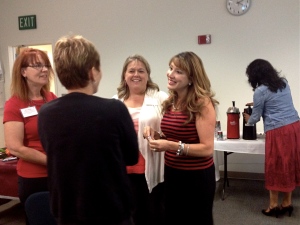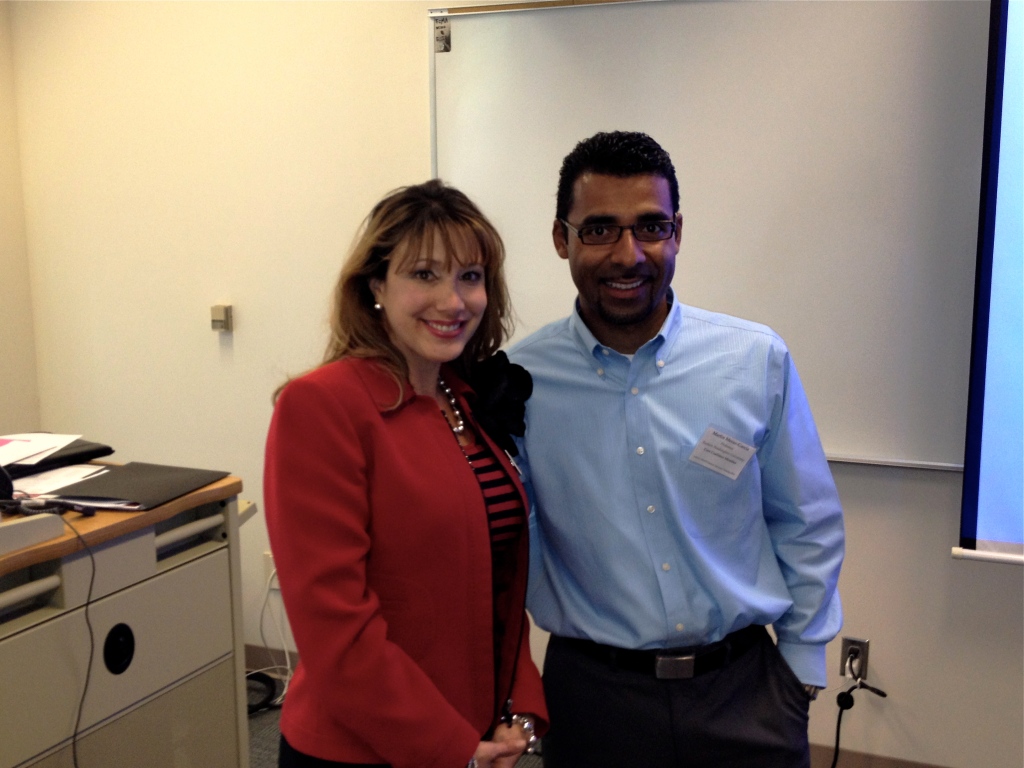She gestures to the two Latino faces on the screen, both strategically blurred-out to obscure identity. “He works at Boeing now. She graduated from WSU Tri-cities with her MBA.” She pauses allowing the workshop participants time to take in these accomplishments. “I tear up every time I watch this video.” The audience murmurs approval and nods in satisfaction until someone starts to clap and the rest of the seated individuals follow suit with a scattered round of appreciative applause. Marcella Pattinson smiles—the video is just one of many informational pieces assembled by the Washington State Educational Access Coalition to raise awareness of HB 1079.
THE COALITION
A crowd of 40 school district officials, community members, students and various Washington State University personnel met with Pattinson and co-presenter Martín García at WSU Vancouver on Sept. 11 to raise HB 1079 awareness.
While some of the public understands that HB 1079 allows eligible undocumented immigrants to pay Washington tuition rates, misinformation still surrounds the law. Many Washingtonians do not realize that, while 1079 students receive resident tuition rates, they do not receive state or federal aid. Pattinson and García hope to remedy these issues of misinformation.
Pattinson, a bilingual/multicultural financial aid counselor for WSU, and García, an assistant professor of Chicano studies and political science at Eastern Washington University, both came as representatives of the recently formed Washington State Educational Access Coalition (WSEAC).
Funded with a grant from College Spark—which supports programs helping low-income students prepare for college—WSEAC includes WSU, University of Washington, Eastern Washington University, Central Washington University, South Seattle Community College and the Latino Education Achievement Project.
Known informally as “the coalition,” WSEAC seeks to raise general awareness of HB 1079. The coalition develops reports to inform policymakers and generates information about statewide best practices at high schools and colleges.
Boiled down to a single sentence, the coalition serves as a network of support for 1079 students.
“The government passes laws like HB 1079, but it doesn’t always provide the resources to educate on legislation. 10 years later, the public is still largely unaware of what it means—that’s where we can help,” said García.
FOCUSING ON STUDENTS

Pattinson talks with (left to right) Helen Gregory, Student Services Administrative Manager; Nancy Youlden, Vice Chancellor of Student Affairs; and April Lappin, Financial Aid Manager.
Grounded in this idea, the WSU Vancouver workshop served as the debut training session from the coalition. The workshop angled towards those working in direct capacity with 1079 students. García and Pattinson delved into the history of the law, addressed common misconceptions, shared success stories of graduated 1079 students and provided guidelines for appropriately handling confidential situations with students.
The larger issue, always hovering just below the surface, remained the political implications HB 1079 presents for immigration. Although the coalition deals with an inherently politicized issue and conducts studies that will potentially shape public policy, the members avoid dredging up personal politics in order to maintain focus on the students.
“Some of us may have certain views about the issues of immigration, and that’s fine—we all have the right to our individual views about immigration. But for state employees, we all have a responsibility to serve the students,” said García. “In our world—the education world—there is no ‘legal’ or ‘illegal’ student. For our purposes, they are all students regardless of status.”
While García articulately presented a myriad of facts and legalities, Pattinson underscored the emotional aspects and drew on her experiences working with students at WSU’s financial aid department.
“We heard the voice of the 1079 students in focus groups, and one of the things we heard is that it’s hard for them to relate.” said Pattinson addressing the psychological barrier of isolation facing 1079 students. “Role models? They don’t have any—they are role models for themselves.”
Other barriers mentioned by Pattinson included lack of support before and after high school graduation and parental opposition. According to Pattinson, resources are often not available to 1079 students during high school. Some counselors may even unintentionally disseminate misinformation by warning undocumented immigrants that they cannot attend college. Complicating this issue, Pattinson explained that many immigrant parents are equally misinformed and discourage their children from applying to college due to fear of deportation.
“One of the biggest myths is that the federal government does not allow undocumented students to go to school, and that’s not the case. No federal law specifically prohibits it,” said Pattinson.
State laws do vary on the issue—which I will discuss more in-depth later in this blog series—but undocumented students in Washington cannot be deported for applying to college.
LOOKING FORWARD
One bright point of interest mentioned repeatedly during the training, remained President Obama’s deferred action program. A hot topic nationwide, the impact of deferred action warrants further discussion, which I will also cover later in this series. Essentially though, the program will offer many 1079 students in Washington the chance to apply for a temporary two-year work permit, provided they meet certain conditions.
For the coalition, deferred action comes as a welcome change that will influence the way the public perceives 1079 students and how undocumented immigrants view their own identity.
“Because of deferred action, students can feel at ease and breathe a little better. Otherwise, they’re still living in the shadows,” said García.
The coalition plans to host more sessions training community members and education professionals on proper protocol for helping 1079 students. Its work is expanding rapidly—fueled by ongoing legislation and public engagement with the topic.
Looking forward, groups like the coalition and programs such as deferred action, have the potential to generate a wave of further awareness and understanding. 1079 students may soon find enough strength in their own identity to step out from behind the blurred masks of anonymity and share their stories with the rest of the world.

